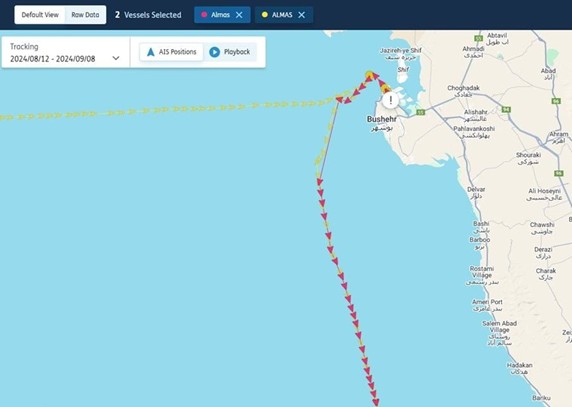Iranian shipments to Houthi-controlled ports have unveiled a troubling trend of sophisticated manipulation within maritime operations. Recent investigative reporting from Lloyd’s List highlights intricate efforts to obscure vessel identities and bypass international oversight mechanisms, spotlighting a critical gap in maritime security and compliance.
Comoros-flagged Almas (IMO: 8864957) is a clear example of a ship employing deceptive shipping practices. During a direct voyage from Iran to Hodeidah in October 2023, Almas transmitted exclusively through a class B AIS transponder—a system designed for smaller vessels that omits critical identifying information like IMO numbers.
As Lloyd’s List Intelligence data scientist Thomas Spriggs explains, “It’s kind of like pulling up your hood and trying to walk through a busy crowd. The use of two AIS transponders on board shows malicious intent as they are actively swapping AIS data for a period of time.” This deliberate switching between Class A and Class B transponders creates a significant challenge for tracking the vessel given the lack of identifying information.
This is complicated by the fact that the Maritime Mobile Service Identity Number which Almas is using during the voyage is fraudulent. A MMSI is a unique nine-digit number assigned to a vessel by a flag registry for identifying and communicating via radio and AIS.
The MMSI, which is the only identifying number for Almas, suggests the vessel is flagged with Belize.
The Belize registry told Lloyd’s List that Almas was only given a special registration valid for three months in 2022.AIS data shows Almas transmits simultaneously from both class A and class B systems after the voyage to Hodeidah. This means it has two identities which it can use interchangeably for the purpose of evading detection and disguising its true identity.

Source: Lloyd’s List Intelligence / Seasearcher
This intricate web of activities showcases how actors, including the Houthis and their support network, leverage AIS manipulation to move cargo.
Challenges in detection: Houthi-controlled ports
Beyond AIS manipulation, our investigation uncovered multiple layers of deception that create significant detection challenges:
Flag fraud represents another critical vulnerability, with vessels using MMSIs affiliated with flag states they’re not registered with. The Belize registry confirmed that Almas had only a brief special registration in 2022, yet continued using Belize-affiliated identifiers long after cancellation.
The inspection gap presents perhaps the most concerning challenge. While most vessels calling at Houthi-controlled ports do stop in Djibouti to be inspected by theUN Verification and Inspection Mechanism (UNVIM) checks, security experts note that after inspection, vessels can rendezvous with dhows to load weapons before continuing to Houthi ports. As Nadwa Al-Dawsari, a non-resident fellow at the Irregular Warfare Initiative, notes: “It’s impossible to stop every ship. There are simply too many and most are disguised in ways that make detection difficult.”
Why it matters
The manipulation of AIS data is a global compliance concern. These tactics are employed in everything from smuggling to sanctions evasion to make it as difficult as possible for this activity to be detected and disrupted. As these tactics become more sophisticated, the burden on compliant owners and operators increases, as does the potential exposure to unwanted trade.
As OFAC continues to ramp up enforcement actions against sanctions evasion, maritime stakeholders need more than just static watchlists. The identification of these deceptive shipping practices requires a comprehensive, data-driven approach that can detect:
Lloyd’s List Intelligence’s Seasearcher Advanced Risk & Compliance platform delivers the critical capabilities needed to unmask these deceptive tactics. With real-time anomaly detection, comprehensive vessel screening, and intuitive risk scoring, maritime stakeholders can strengthen their compliance posture while streamlining operations.
Request a consultation to learn how Seasearcher can transform your maritime sanctions compliance and protect your operations from hidden risks.
Intelligent, actionable compliance insight designed to make your life easier
